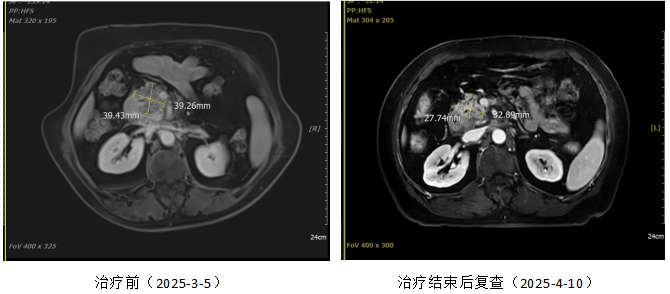Female patient, 63 years old, pancreatic malignant tumor
Patient: Ma XX, female, 63 years old, admitted due to "confirmed pancreatic malignancy for 2 weeks."
[Clinical Summary]
1. PET-CT: Hypermetabolic focus in the pancreatic head, consistent with pancreatic cancer; accompanied by metastatic lymph nodes around the abdominal aorta and multiple bilateral pulmonary nodules (some suspected metastases).
2.Abdominal MRI: Mass in the pancreatic head invading the portal vein and superior mesenteric vein, with dilation of the pancreatic duct and common bile duct.
3.Pathological Diagnosis: Pancreatic mass biopsy confirmed adenocarcinoma.
[Clinical Diagnosis]
Malignant pancreatic tumor with lung metastasis (pancreatic head, adenocarcinoma, cT3N1M1 Stage IV, KPS score: 80).
[Treatment Plan]
1.Carbon-ion radiotherapy: Total dose 58.5 Gy (RBE)/14 fractions.
2.Concurrent chemotherapy: Gemcitabine + nab-paclitaxel regimen.
[Treatment Response Assessment]

Left image: Before treatment; Right image: One month after treatment.
This case demonstrates the significant efficacy of heavy-ion radiotherapy in the treatment of locally advanced and metastatic pancreatic cancer. Through personalized treatment, the patient exhibited a marked reduction in tumor marker levels and significant imaging improvement.
Moreover, carbon-ion therapy not only demonstrates remarkable tumor suppression during treatment but also exhibits sustained biological advantages post-treatment. This effect allows the tumor to continue shrinking for 3-6 months after therapy, reaching its peak response at 6 months. Due to carbon ions inducing DNA double-strand breaks, their tumoricidal effect is more thorough, effectively reducing recurrence rates and improving local control. This approach provides patients with longer progression-free survival and enhanced quality of life.For patients with locally advanced or inoperable pancreatic cancer, this technology undoubtedly opens a promising therapeutic pathway.
